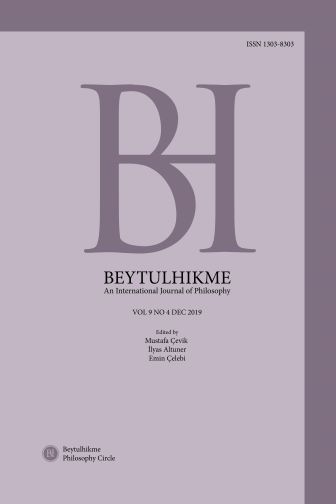Author :
Abstract
Kendine özgü bir ahlak felsefesi ve hayat öğretisi kuran Epiktetos, üç döneme ayrılan Stoa felsefesinin son dönemi olan Roma Stoası ya da Son Stoa denen filozoflar grubunda yer alır. Ondan önce Stoa felsefesinin kurucusu olan ve M.Ö. 3. yüzyılda yaşayan Kıbrıslı Zenon’un da içinde bulunduğu İlk Stoa ve uzlaşmacı bir tavır sergileyen Orta Stoa dönemleri yaşanmıştı. Orta Stoa dönemini temsil eden Panaitios (M.Ö. 180-110) ve öğrencisi Poseidonios’dur (M.Ö. 135-51). Bunlar Platon ve Aristoteles’in görüşlerini Stoanın kurucusu Kıbrıslı Zenon’un görüşleriyle uzlaştırmak için çabaladıklarından doğal olarak İlk Stoanın görüşlerinden oldukça uzaklaşmışlardı. Bunlar aynı zamanda, Helenistik kültürün etkisiyle daha eklektik bir düşünce sistemi kurmuşlardı. Roma Stoası işte bu uzlaşmacı ve eklektik tavra karşı çıkarak yeniden İlk Stoa öğretisine dönüşü temsil eder. Bu makalede Stoa düşüncesi ve hayat felsefesi geleneğinin tarihsel süreçlerini göz önünde bulundurarak Roma Stoasının en önemli filozoflarından biri olan Epiktetos’un irade, eylem ve özgürlük kavramlarının iç bütünlüğü konu edilecektir. Makalenin ana tezi Epiktetos’un ortaya koyduğu özgürlük anlayışının çağdaş insanın özgürlük anlayışıyla taban tabana zıt olduğudur.
Keywords
Abstract
Epictetus, who established a distinctive moral philosophy and doctrine of life, belongs to the group of philosophers called Roman Stoics or Last Stoics, which is the last period of the three periods of the Stoic philosophy. The first Stoics, including Zenon of Cyprus, which was the founder of the Stoic philosophy and lived in the 3rd century BC, and the Middle Stoics, which had a conciliatory attitude. Panaitios (180-110 BC) and Poseidonios (135-51 BC), represent the Middle Stoic period. Naturally, they were very distant from the views of Plato and Aristotle, as they were trying to reconcile the views of the founder of the Stoics with those of Zenon of Cyprus. They also established a more eclectic system under the influence of Hellenistic culture. The Roman Stoics represent a return to the first Stoic doctrine, opposing this conciliatory and eclectic attitude. In this article, the internal integrity of the concepts of will, action and freedom of Epictetus, one of the most important philosophers of the Roman Stoic, will be discussed by considering the historical processes of Stoic thought and the philosophy of life tradition. The main thesis of the article is that Epictetus's understanding of freedom is in direct contrast with the understanding of freedom of modern man.
Keywords
- Akar, B. (2014). Epiktetos ve Proairesis. Hierapolisli Bir Filozof: Epiktetos. (Ed. H. H. Erdem & M. Günay). Ankara: Türkiye Felsefe Kurumu Yayınları.
- Epictetus (1995). The Discourses: The Handbook Fragments. (Trans. R. Hard). Lon- don: Everyman.
- Epiktetos (1989). Düşünceler ve Sohbetler. (Çev. B. Toprak). Ankara: Milli Eğitim Bakanlığı Yayınları.
- Hirschberger, J. (1976). A Short History of Western Philosophy. Guildford and Lon- don: Lutterworth Press.
- Mark, J. (2019). Epictetus. Ancient History Encyclopedia. Web: 28 Nisan 2011.
- Mutlu, E. Ç. (2018). Epiktetos’ta Ölüm Üzerine. Gaziantep University Journal of Social Sciences. 17 (4), 1262-1269.
- Önal, M. (2007). Epiktetos. Felsefe Ansiklopedisi, cilt 5. (Ed. A. Cevizci). Ankara: Ebabil Yayınları.
- Önal, M. (2015). Epiktetos’un Mutluluk Öğretisi: Nasıl Mutlu Olabilirim? Malatya: Bilsam Yayınları.
- Önal, M. (2018). Epiktetos’ta Ölüm ve Sonrası. Özne, 29, 107-116.
- The Oxford Companion to Philosophy (1995). (Ed. T. Honderich). Oxford and New York: Oxford University Press.
- Toprak, B. (1989). Epiktetos Hakkında Birkaç Söz. Epiktetos, Düşünceler ve Soh- betler. (Çev. B. Toprak). Ankara: Milli Eğitim Bakanlığı Yayınları.
- Yazıcı, S. (1999). Epiktetos’un Ahlâk Felsefesinde Akılcılık ve Doğalcılık. Felsefe Dünyası, 29, 101-109.
- https://www.britannica.com/biography/Epictetus-Greek-philosopher. Erişim Tarihi: 12.02.2019. Öz: Kendine özgü bir ahlak felsefesi ve hayat öğretisi kuran Epiktetos, üç döneme ayrılan Stoa felsefesinin son dönemi olan Roma Stoası ya da Son Stoa denen filozoflar grubunda yer alır. Ondan önce Stoa felsefesinin kurucusu olan ve M.Ö. 3. yüzyılda yaşayan Kıbrıslı Zenon’un da içinde bulunduğu İlk Stoa ve uzlaşmacı bir tavır sergileyen Orta Stoa dönemleri yaşanmıştı. Orta Stoa dönemini temsil eden Panaitios (M.Ö. 180-110) ve öğrencisi Poseidonios’dur (M.Ö. 13551). Bunlar Platon ve Aristoteles’in görüşlerini Stoanın kurucusu Kıbrıslı Zenon’un görüşleriyle uzlaştırmak için çabaladıklarından doğal olarak İlk Stoanın görüşlerinden oldukça uzaklaşmışlardı. Bunlar aynı zamanda, Helenistik kültürün etkisiyle daha eklektik bir düşünce sistemi kurmuşlardı. Roma Stoası işte bu uzlaşmacı ve eklektik tavra karşı çıkarak yeniden İlk Stoa öğretisine dönüşü temsil eder. Bu makalede Stoa düşüncesi ve hayat felsefesi geleneğinin tarihsel süreçlerini göz önünde bulundurarak Roma Stoasının en önemli filozoflarından biri olan Epiktetos’un irade, eylem ve özgürlük kavramlarının iç bütünlüğü konu edilecektir. Makalenin ana tezi Epiktetos’un ortaya koyduğu özgürlük anlayışının çağdaş insanın özgürlük anlayışıyla taban tabana zıt olduğudur. Anahtar Kelimeler: Epiktetos, Stoa Felsefesi, özgürlük, irade, Tanrı.





